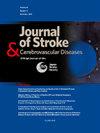韩国癌症患者缺血性中风的风险:来自国民健康保险数据的见解
IF 2
4区 医学
Q3 NEUROSCIENCES
Journal of Stroke & Cerebrovascular Diseases
Pub Date : 2025-03-07
DOI:10.1016/j.jstrokecerebrovasdis.2025.108281
引用次数: 0
摘要
目的本研究旨在比较癌症患者和非癌症患者缺血性脑卒中的累积发病率,估计癌症患者与非癌症患者脑卒中的风险比,并将我们的结果与其他全国性研究的结果进行比较。材料和方法我们从2011年至2015年的韩国国民健康保险服务数据库中招募了91424名诊断为癌症的患者,并招募了182848名对照组。这些参与者被随访了5年。在6个月、1年、3年和5年的随访期间,我们估计了所有癌症类型和9种特定癌症类型的患者组中缺血性卒中发生的风险比。结果除结直肠癌、胆囊癌、胆管癌和头颈癌外,所有类型的肿瘤早期缺血性脑卒中的累积增加斜率均高于较长随访时间。随访6个月后,癌症患者的缺血性卒中风险高于无癌症患者(95%可信区间[CI]: 1.56-1.94)。在3-5年内,与无癌症患者相比,肺癌(CI: 1.56-2.04)、胰腺癌(CI: 1.33-1.95)和肝癌(CI: 1.07-1.39)患者的缺血性卒中风险增加,而甲状腺癌(CI: 0.79-1.13)、胃癌(CI: 0.92-1.17)、结直肠癌(CI: 0.69-1.48)、胆囊癌(CI: 0.91-9.89)、胆管癌(CI: 0.39-3.50)和头颈癌(CI: 0.26-74.30)患者的缺血性卒中风险没有显著增加。结论我们对胃癌、结直肠癌和肝癌的研究结果与西方研究结果不同。在使用基于保险的数据时,在每个国家进行全国性的研究,而不是应用其他国家的研究结果,更有利于预测和预防癌症患者的缺血性中风发展。本文章由计算机程序翻译,如有差异,请以英文原文为准。
Risk of ischemic stroke in korean patients with Cancer: Insights from national health insurance data
Objectives
This study aimed to compare the cumulative incidence of ischemic stroke between patients with and without cancer, estimate the hazard ratio of stroke in patients with cancer compared to those without cancer, and compare our results with those of other nationwide studies.
Materials and Methods
We recruited 91,424 patients diagnosed with cancer from the Korean National Health Insurance Service database between 2011 and 2015 and enrolled 182,848 controls. These participants were followed up for 5 years. We estimated the hazard ratios for ischemic stroke occurrence in the patient groups for all cancer types and nine specific cancer types during follow-up at 6 months and 1, 3, and 5 years.
Results
For all cancer types, except colorectal, gallbladder, bile duct, and head and neck cancers, the slope of the cumulative increase in ischemic stroke in the early period was higher than that in longer follow-up durations. Ischemic stroke risk was elevated after the 6-month follow-up in patients with cancer compared to patients without cancer (95% confidence interval [CI]: 1.56–1.94). Over 3–5 years, Ischemic stroke risk increased in patients with lung (CI: 1.56–2.04), pancreatic (CI: 1.33–1.95), and liver cancers (CI: 1.07–1.39), compared to cancer-free individuals, whereas no significant increase was observed in patients with thyroid (CI: 0.79–1.13), stomach (CI: 0.92–1.17), colorectal (CI: 0.69–1.48), gallbladder (CI: 0.91–9.89), bile duct (CI: 0.39–3.50), and head and neck (CI: 0.26–74.30) cancers.
Conclusion
Our findings regarding stomach, colorectal, and liver cancers differ from the results of Western studies. Conducting a nationwide study within each country, rather than applying findings from other countries, is preferable for predicting and preventing ischemic stroke development in patients with cancer when using insurance-based data.
求助全文
通过发布文献求助,成功后即可免费获取论文全文。
去求助
来源期刊

Journal of Stroke & Cerebrovascular Diseases
Medicine-Surgery
CiteScore
5.00
自引率
4.00%
发文量
583
审稿时长
62 days
期刊介绍:
The Journal of Stroke & Cerebrovascular Diseases publishes original papers on basic and clinical science related to the fields of stroke and cerebrovascular diseases. The Journal also features review articles, controversies, methods and technical notes, selected case reports and other original articles of special nature. Its editorial mission is to focus on prevention and repair of cerebrovascular disease. Clinical papers emphasize medical and surgical aspects of stroke, clinical trials and design, epidemiology, stroke care delivery systems and outcomes, imaging sciences and rehabilitation of stroke. The Journal will be of special interest to specialists involved in caring for patients with cerebrovascular disease, including neurologists, neurosurgeons and cardiologists.
 求助内容:
求助内容: 应助结果提醒方式:
应助结果提醒方式:


